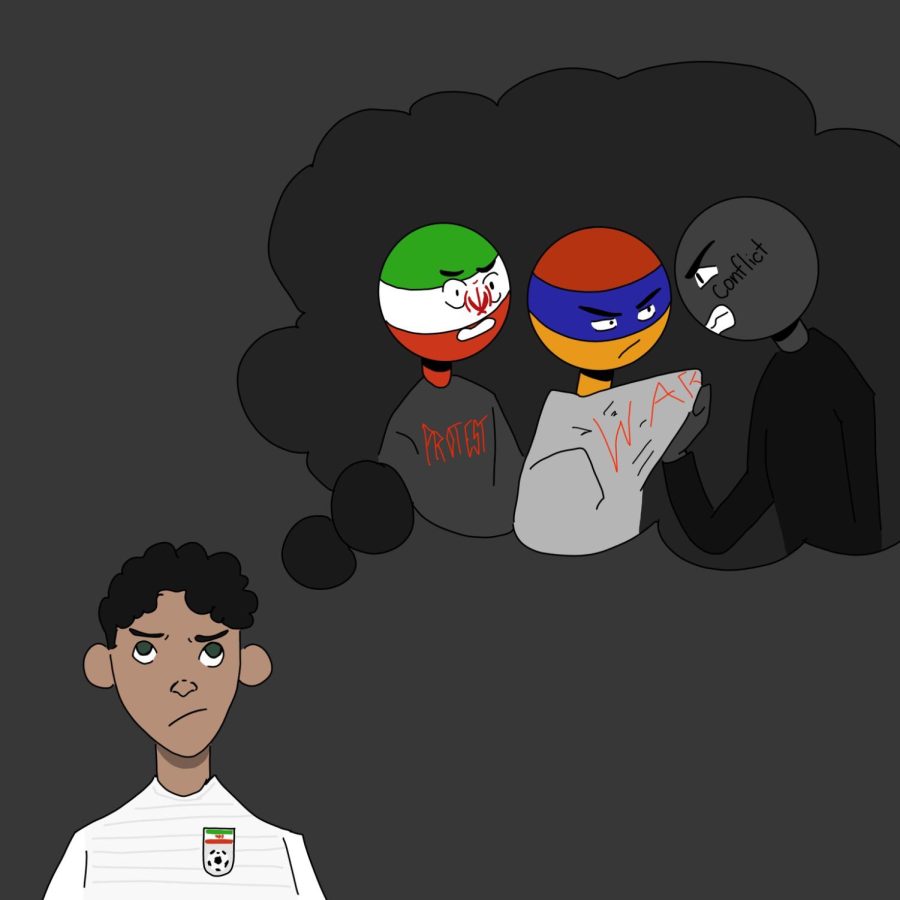With the rise of social media worldwide, students are becoming increasingly aware of conflicts in other countries. However, for many, the process of passing information has been de-personalized to infographics or hashtags. This is not the case with many students who are personally and familiarly connected to the struggles happening in their home countries.
This past September in Armenia, there were ceasefires and clashes by Azerbaijani troops that killed more than 300 people. At the same time, in Iran, protests spread after the tragic killing of Mahsa Amini by the Iranian government, causing at least 185 casualties.
These current conflicts in both countries have emotionally shattered Iranian and Armenian students. The abhorrent violation of civil rights continuously harms their families and friends who did not have the opportunity to move. While their country is torn with chaos and violence, students here suffer as they feel sorrow for their people.
“Armenia has a long history with Turkey and Azerbaijan, its two neighboring countries. Important events that stand out in my opinion are the Armenian genocide, which was the mass murder (estimated to be 1.5 million) by the Ottoman Empire of ethnic Armenians in 1915. They had to flee their land and it displaced 100,000+ families. Another important event happened in 2020, which was known as the Nagorno – Karabakh war. This is a region that has a huge conflict surrounding it with Armenians claiming it was their land and Azerbijanis claiming it was theirs. It was estimated that over 6,500 soldiers died in the war on both sides with a ceasefire and the victory of Azerbaijan taking control of most parts of the land,” sophomore Mane Torosyan said.
When facing the conflicts while in the US, Torosyan is comforted by the family heirloom that connects her to Armenia.
“In French class, I talked about an important pendant that belonged to my great, great grandmother. She was a victim of the Armenian Genocide and she had to flee her home to escape getting unjust treatment. The place she grew up, the place she had known to be her home for her whole life, she had to run away from. Her homeland was taken from her and one of the only things she had was a pendant. This pendant has been passed down in the generations and for me it symbolizes how important it is to remember the tragedies that happened and to say ‘1915 never again.’ This is an important quote in Armenian activism and it protests for the recognition of this genocide. Most current day Armenians, including myself, don’t blame modern day Turkish civilians. But, we do blame the governments (like the Turkish one) which insist that it never happened. It is important to recognize such a significant part of history to ensure it never happens again,” Mane said.
The Armenian struggles are continuous, and there has been no outside aid or much awareness of the issue abroad. The recognition of the innumerable casualties is necessary for both justice and protection of the Armenian people.
Meanwhile, the coverage in Iran has been more prevalent, but the personal voice of the individuals there have remained forcefully silenced.
The government claimed that the girls had killed themselves by jumping from buildings. But family members immediately rejected those accusations, telling the media and human rights groups that the girls had been beaten to death.
— Farnaz Fassihi
This perspective is accredited by Iranian students who fear their country’s corrupt and violent government.
“The Regime has been in Iran for around 50 years after the Shah. they are messing with the people of Iran; messing with their minds through brainwashing from a young age. They have changed the “real Islam” through force and violence, just for their own benefit. The government is taking all of the peoples’ money and spending it themselves. The authorities’ families are living their best lives in LA and London, while our people are living in bad situations due to the increasing inflation and violence,” junior Melina Momen said.
Momen’s older sister was unable to immigrate like the rest of her family, and it has been extremely painful for them to witness the conflicts.
“I feel really sorry for my people, for my own sister. I wish I could help, but I can’t find the words or actions to make things better while I am safe in the US. I just wish everything goes well, in the conflict and protests. I wish they would stop killing,” Momen said.





































